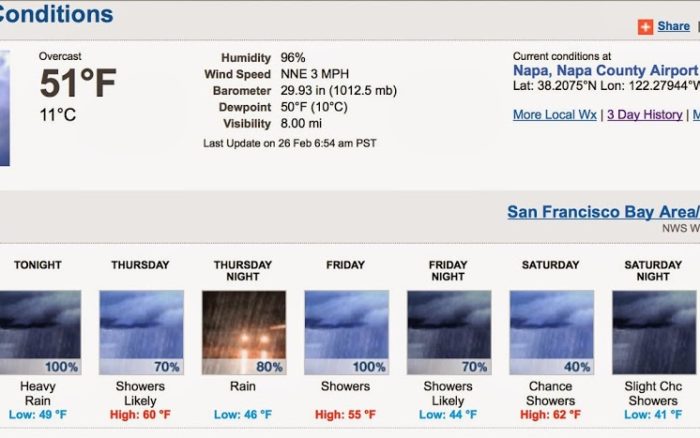| Sigh of Relief! |
Drought: What We Need to Change
The courtyard pavement glistened in the early dawn this morning. I felt myself sigh with relief. The promised rain was beginning. It has steadily picked up. The weather predicts heavy rain today and tonight, even 6 inches before the current series of storms have passed over the next days.
And yet, we are in drought throughout California. Yes, our ranch irrigation ponds are in pretty good shape after the last deluge, 10 inches in a week, but the larger picture is much more dire. 2013 was the driest year on record in California. Again, on our ranch we enjoyed heavy rain in December 2012, and our irrigation ponds filled. But then the rains stopped, and they really did not start in any significant way until two weeks ago.
Last week I interviewed activist Charlie Toledo, Executive Director of the Suscol Intertribal Council, about the drought. She sits on several state boards and was a part of the early planning of the Napa Flood Control Plan in the early to mid 1990’s. That four part interview can be read over this next week at harms-ecolog.com. More than anything else, what I take away from this interview is that our practices and plans, which continue to be of the dominion-over kind of mind-set, contribute to the worsening condition of our headwaters and watersheds. While Charlie describes the atmosphere within the state boards to be serious and cooperative if also coming from different perspectives, she also fails to see any serious plans to re-establish riparian corridors, crucial to the health of waterways. Of the seven major headwaters in California, four are going dry.
Last weekend’s seminar on the environment at the C. G. Jung Institute of San Francisco addressed the change of consciousness required of us at this time. (See two previous blogs on www.patriciadamery.com) Drought is an outer issue, but it is an inner one as well. There are those feelings of entitlement that all of us have, revealed even in our lack of attention to what goes down the drain. But there is also that lack of awareness afforded by intellectual development, industrialization, and scientific research which is out of balance with interconnectedness: there are also non-human presences here on earth with us who also have right-to-life. We are only one part of an interconnected community. And then there is the big question: Can we learn to live with them and not exploit them only for our own purposes?
